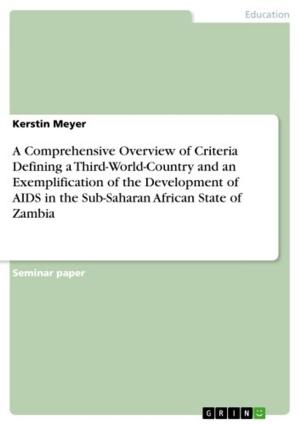'Third world people going to the white man country'
Forms and functions of the representation of caribbean immigrants in Dionne Brand's 'In Another Place, Not Here'
Fiction & Literature, Literary Theory & Criticism, British| Author: | Dirk Steines | ISBN: | 9783638784801 |
| Publisher: | GRIN Publishing | Publication: | May 26, 2007 |
| Imprint: | GRIN Publishing | Language: | English |
| Author: | Dirk Steines |
| ISBN: | 9783638784801 |
| Publisher: | GRIN Publishing |
| Publication: | May 26, 2007 |
| Imprint: | GRIN Publishing |
| Language: | English |
Seminar paper from the year 2007 in the subject English Language and Literature Studies - Literature, grade: 1,7, University of Cologne (Englisches Seminar), course: Canadian Women's Writing, 16 entries in the bibliography, language: English, abstract: Although multiculturalism became an official government policy iduring the 1970s, this was not mirrored on the literary scene in Canada instantly. It was not before the 1980s and 90s when an emerging group of female writers, who offered alternative accounts for the representation of different individual concepts of the self, came into the public focus. Finding answers to what constitutes Canadian identity becomes more and more difficult, when literary backgrounds and biographies shift from linear to more complex settings. Being born in 1953 on the Caribbean island of Trinidad, Dionne Brand stands for the 'New Voices of the 1990s' (Howell 205), especially for the emergence of authors coming from an African descent. Her experiences as a teacher and as social and political activist provide a rich soil for her narrative imagination as she 'conveys her politics in her poetry, essays, and films, as well as through her community activism' (Johnson and Curtright). Being a lesbian black feminist, she revives some of her experiences of being marginalized in several ways and reconsiders them in In Another Place, Not Here in a love story of two black women, which is situated partially in Toronto and the Caribbean. In this paper I will argue, that Brand takes on a position in her novel, which shows that the construction of an identity for (lesbian) Caribbean-Canadian women cannot be based on assimilation into the society of Canadian urban areas at its current appearance, since it oppresses marginal groups in various ways. The question of home or 'here', which is central in an individual's identity, is constantly being negotiated, as the title of the novel already implies, within the individual characters of the novel. For this purpose I will examine the representation of Elizete and Verlia, the two protagonists of the novel, and Verlia's aunt and uncle in Sudbury, who hosted her the first weeks after she had come to Canada. In doing so, I will refer to theoretical frameworks of the neo-slave narrative and the concepts of 'Passing' and 'The Black Atlantic' as they provide fruitful applications for interpreting the novel in this context.
Seminar paper from the year 2007 in the subject English Language and Literature Studies - Literature, grade: 1,7, University of Cologne (Englisches Seminar), course: Canadian Women's Writing, 16 entries in the bibliography, language: English, abstract: Although multiculturalism became an official government policy iduring the 1970s, this was not mirrored on the literary scene in Canada instantly. It was not before the 1980s and 90s when an emerging group of female writers, who offered alternative accounts for the representation of different individual concepts of the self, came into the public focus. Finding answers to what constitutes Canadian identity becomes more and more difficult, when literary backgrounds and biographies shift from linear to more complex settings. Being born in 1953 on the Caribbean island of Trinidad, Dionne Brand stands for the 'New Voices of the 1990s' (Howell 205), especially for the emergence of authors coming from an African descent. Her experiences as a teacher and as social and political activist provide a rich soil for her narrative imagination as she 'conveys her politics in her poetry, essays, and films, as well as through her community activism' (Johnson and Curtright). Being a lesbian black feminist, she revives some of her experiences of being marginalized in several ways and reconsiders them in In Another Place, Not Here in a love story of two black women, which is situated partially in Toronto and the Caribbean. In this paper I will argue, that Brand takes on a position in her novel, which shows that the construction of an identity for (lesbian) Caribbean-Canadian women cannot be based on assimilation into the society of Canadian urban areas at its current appearance, since it oppresses marginal groups in various ways. The question of home or 'here', which is central in an individual's identity, is constantly being negotiated, as the title of the novel already implies, within the individual characters of the novel. For this purpose I will examine the representation of Elizete and Verlia, the two protagonists of the novel, and Verlia's aunt and uncle in Sudbury, who hosted her the first weeks after she had come to Canada. In doing so, I will refer to theoretical frameworks of the neo-slave narrative and the concepts of 'Passing' and 'The Black Atlantic' as they provide fruitful applications for interpreting the novel in this context.















